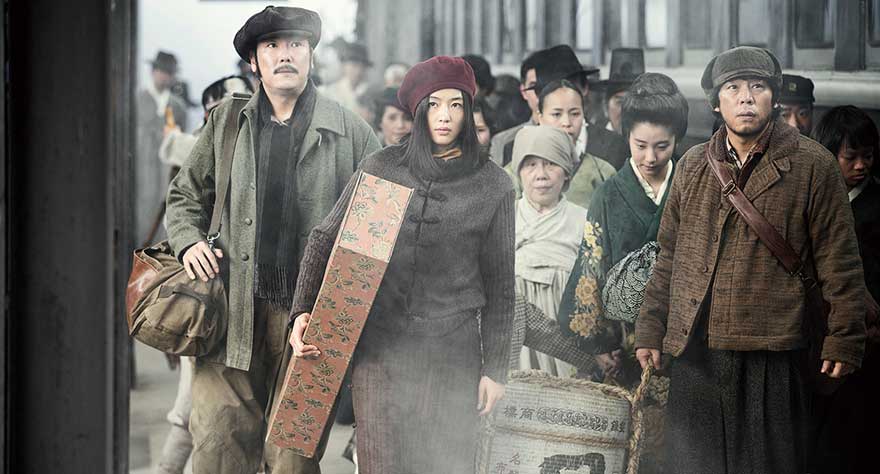
Tries to do too much and becomes unwieldy too early, losing both focus and viewer interest in the process.

Tries to do too much and becomes unwieldy too early, losing both focus and viewer interest in the process.
I’ve come to be spoiled on period dramas from Asia. Excellent films like The Last Tycoon (1910-1940 China), Masquerade (16th century Korea), War of the Arrows (17th century Korea), and The Gangster (1950s-1960s Bangkok) are great examples of movies made by filmmakers who understand the critical need to properly manage drama and action within the broader scope of history to produce a robust and high-quality film. Assassination looks to join those ranks, and it has two great things going for it out of the gate: director Choi Dong-hoon, whose previous outing was the slick and entertaining heist flick The Thieves, and star Gianna Jun, a high-profile Korean actress also of The Thieves as well as Blood: The Last Vampire.
Assassination is set in 1930s China, and during this time in history Korea is under Japanese rule; the Korean resistance hides from Japanese authorities in China’s northeast region, known as Manchuria. In an effort to thwart the Japanese, the provisional Korean government hatches a plan to assassinate two key Japanese authority figures. The government appoints Yem Sek-jin (Lee Jung-jae) to recruit three military prisoners—experts the Japanese government knows nothing about—to do the job: military school graduate Big Gun (Cho Jin-woong), explosives expert Duk-sam (Choi Deok-moon), and sniper Ahn Okyun (Gianna Jun).
Despite the players’ degree of expertise, the plan does not go smoothly. There is a traitor in the midst of the provisional government who tips off the Japanese leadership. They, in turn, hire freelance killer Hawaiian Pistol (Ha Jung-woo) and his partner (Oh Dal-soo) to eliminate the freedom-fighting trio and quash the resistance.
Based on that description alone, Assassination sounds reminiscent of many American films, particularly from the 1980s, where experts are assembled to carry out some critical mission (everything from Vietnam drama Uncommon Valor to sci-fi/actioner Predator springs to mind), and not everyone makes it back alive, and those that do are forever changed. This happens in Assassination, but where those other films might include some backstory or a little personal drama to add depth to the film, this one adds an inordinate amount of backstory, subplot, and supporting characters. This scope, with an expansive and critical period in history as the backdrop, is the film’s fatal problem.
Trouble begins in the opening scenes, both in structure and in theme. Structurally, the film opens in 1911 with something of a vague prologue, shifts to 1949 and the investigation of anti-national crimes, and then settles into its primary calendar point of 1933. This past/future/present construct sets a rocky tone for the film, making it difficult to know what, if any, time-shifts will occur again, and whether or not the film will play out in three different eras. Those issues (sort of) get resolved as time goes on, but to reveal more would require an explanation of actions and events so lengthy it would spoil a lot and undermine the purpose of actually watching the film.
Thematically, that vague prologue comes into greater focus as the film progresses, ultimately maturing into a predictable set-up for a plot twist that disintegrates into contrived melodrama—unrelated to the assassination plot—that sets up third-act (and even epilogue) events that attempt to be Shakespearean. And that’s only with one main character; this film has five other main characters, plus many smaller ones, and this, too, greatly hampers the film. Its players and their stories are sprawling to the point of being unwieldy, with a constant sense of urgency to wrap the current scene featuring some characters so as to get to the next scene featuring other characters. Choi, as screenwriter, sets himself up for directorial failure with a story that wants to say and do far too much, even within its lengthy 140-minute run time. All of this rushing makes for lackluster direction.
Such as it is, the film becomes an exercise in tolerating the story until it drives to the next action set-piece, which is where Choi’s directorial flair is put to better use. It also puts Jun to better use, whose considerable talent—both as an actress and as an action star—is mostly wasted here. She does well with her dramatic scenes and her action scenes are electrifying (including a great rooftop-to-ground descent that is NOT performed by a stunt double), but her scenes are too brief and too far between. The technical execution, particularly in the areas of costume design and set decoration, is the film’s other bright spot. Interiors and exteriors are rich with era-appropriate detail, and the costumes adorning characters from all walks of life help set the right mood.
Assassination is ambitious, and it wants desperately to be one of those epics that becomes synonymous with the period in history it tries to portray. It has its moments, but not enough to give it that kind of gravitas. Unlike other Asian period dramas before it, this film neither focuses on a succinct enough subject within the broader context of history, nor does it rise to the challenge of the scope before it.